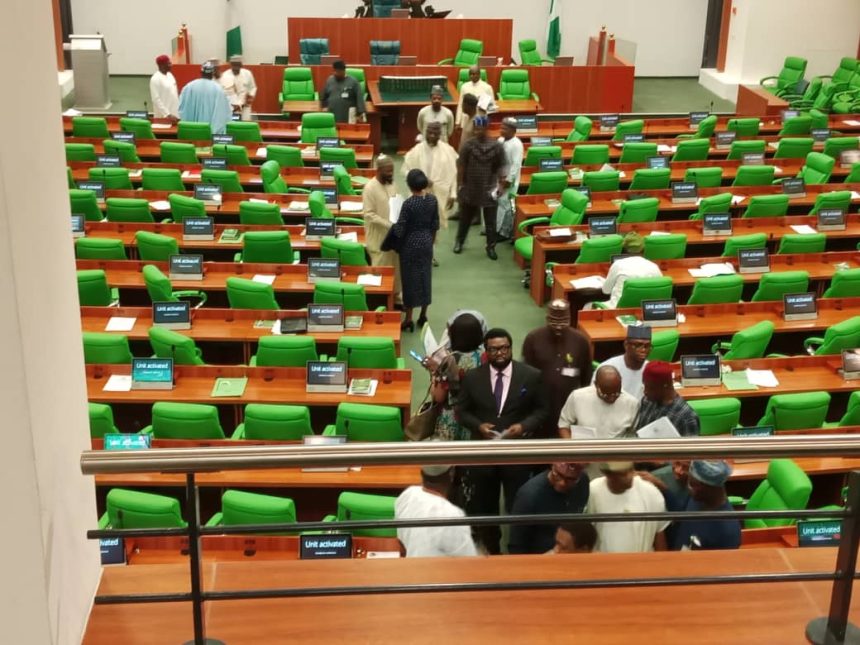The House of Representatives has once more urged the Bola Tinubu-led government to promptly declare a living wage for Nigerian workers, aiming to mitigate the recurrent industrial actions by organized labor.
The House resolution was prompted by a motion of urgent public importance put forth by Mr. Isa Ali, the representative of Balanga/Biliri Federal Constituency in Gombe State.
Ali led the debate on the floor of the green chamber during Wednesday’s plenary, highlighting the ongoing negotiations between the Federal Government and labor unions regarding a minimum wage increase. He expressed disappointment over the lack of positive outcomes from the meetings held thus far.
The lawmaker, affiliated with the Peoples Democratic Party, has urged a reevaluation of the National Minimum Wage Act of 2019, citing shifting circumstances since its inception a few years back.
He said, “Despite the executive’s recommendation of N27,000, the National Assembly took decisive action by repealing and enacting the National Minimum Wage Act of 2019, ultimately setting the minimum wage at N30,000.”
“According to Section 3(4) of the Act, the current minimum wage, which began on April 18, 2019, has concluded its five-year term as of April 18, 2024. Consequently, it is imperative to undertake a thorough review of the existing legislation.”
He further argued that the payment of N35,000 wage award to public servants as a way of cushioning the effect of the economic hardship in the country has not addressed the challenges faced by Nigerian workers.
Contributing to the debate, House Minority Leader, Kinglsey Chinda urged the parliament to pass a New Wage Act speedingly in the manner the National Anthem Bill was passed a fortnight ago.
He said, “Section 14 providof the constitution provides for the security and welfare of the people. Can we say we have carried out that function of governance? Can we say we have provided security and welfare for Nigerians? The answer is NO!
‘In Nigeria, it appears life now equates to one minute silence. Workers are crying about their salaries as it is no longer possible to live on N50,000 a month. Yet, we expect them to earn this serve us. We must provide living wages for the workers. We can’t shy away from living wages while talking about minimum wage.
“I want to say that we should pass a New Wage Act with the speed we passed the National Anthem Act,” adding that even if the President fails to sign it, the parliament can veto the Act.
“Let us recall the Minimum Wage Act and pass it and if the president refuses to sign, then we override him,” he added.
On his part, the member representing Dala Federal Constituency, Kano State, Ali Madaki maintained that the fight against corruption cannot be successful unless workers earn decent wages.
“We can not fight corruption if we don’t have a living wage. The House already adopted a motion on the living wage. Section 16 (2) of our constitution already covered it in the constitution. What Nigerian workers deserve is a living wage and not a minimum wage,” he said.
The Deputy Minority Whip, George Ozodinobi in his contribution, said it would be wrong to pay a minimum wage less than N75, 000 which he said is the current price of a bag of rice in Nigeria.
“I advocate a benchmark of N75,000, which is the price of a bag of rice, while also considering other things like school fees, medicals, and other expenses,” Ozodinobi, a chieftain of the Labour Party said.
Following the adoption of the motion, the House urged the Federal Government to redirect the focus of the negotiations with labour unions from fixing a new minimum wage to fixing a realistic living wage for Nigerians, just as it demanded a downward review of electricity tariff ‘To reduce the suffering of Nigerians.”
A member of the ruling party representing Ikorodu Federal Constituency, Lagos State, Babajimi Benson called for restraint, noting that it is not enough to pressurise the Federal Government to pay a new wage.
“Are we certain the private sector can accommodate the proposed new wage? It’s not merely about urging the government to adopt a figure like N100,000. Minimum wage discussions shouldn’t be a one-size-fits-all scenario, as some states, like Edo, are already paying over N70,000. It’s crucial to consider variations in regional economies.”












